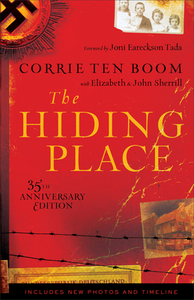You need to sign in or sign up before continuing.
Take a photo of a barcode or cover
emotional
hopeful
informative
inspiring
sad
I saw the movie many years ago, and I really think I saw Corrie ten Boom speak somewhere, but I don't recall where or when. I seem to be on a Holocaust/Civil War kick these days, so I decided to revisit the story, only in book form.
Her struggles make mine seem small, and it encouraged me how strongly (though not perfectly) she held onto her faith. I would venture to say it was the only thing that got her through this ordeal. Then I look at her life since and how many people were transformed by her experience. At the end of the book is a timeline of sorts of her life and the travels she made spreading the story not just of her experience but of the faithfulness and goodness of God. She "worked" well into her 80's. I want to be like that :)
Her struggles make mine seem small, and it encouraged me how strongly (though not perfectly) she held onto her faith. I would venture to say it was the only thing that got her through this ordeal. Then I look at her life since and how many people were transformed by her experience. At the end of the book is a timeline of sorts of her life and the travels she made spreading the story not just of her experience but of the faithfulness and goodness of God. She "worked" well into her 80's. I want to be like that :)
The Hiding Place is a powerful book. The story is about Corrie ten Boom, a dutch watchmaker, who ended up through circumstances becoming a leader of the Dutch underground resistance to German Nazis in WWII. Her account of how this took place was powerful. She talked about how it began as an expression of her Christian commitments to care for her Jewish neighbors and friends, and relied on her organic network of relationships in Harlem, Netherlands.
I was also impressed by the portrayal of various faithful approaches to living out the Christian life. From Corrie’s sister who refused to lie to protect her son or to save the Jewish woman in her household (which in providence turned out not to harm either one) to her other sister Betsy being especially concerned with the spiritual harm that the soldiers and prison guards were inflicting on themselves through their way of life, Corrie expresses her admiration yet differences from both of her sister’s views. Corrie, for example, had no problem lying about the radio hidden in their house or lying about the Jews hiding in their house when they were raided. Likewise, Corrie had a hard time seeing the soldiers and prison guards as human beings, although she repented of that thought.
I also appreciated how each of their views differed from their father who was willing to risk his own life for the sake of others, but not willing to risk the lives of others.
The ten Boom family’s commitment to loving their neighbors well, insistence on listening to the Spirit’s leading in difficult circumstances, and their trust in God’s faithfulness through it all was really inspiring.
I was also impressed by the portrayal of various faithful approaches to living out the Christian life. From Corrie’s sister who refused to lie to protect her son or to save the Jewish woman in her household (which in providence turned out not to harm either one) to her other sister Betsy being especially concerned with the spiritual harm that the soldiers and prison guards were inflicting on themselves through their way of life, Corrie expresses her admiration yet differences from both of her sister’s views. Corrie, for example, had no problem lying about the radio hidden in their house or lying about the Jews hiding in their house when they were raided. Likewise, Corrie had a hard time seeing the soldiers and prison guards as human beings, although she repented of that thought.
I also appreciated how each of their views differed from their father who was willing to risk his own life for the sake of others, but not willing to risk the lives of others.
The ten Boom family’s commitment to loving their neighbors well, insistence on listening to the Spirit’s leading in difficult circumstances, and their trust in God’s faithfulness through it all was really inspiring.
emotional
inspiring
sad
emotional
informative
reflective
slow-paced
dark
emotional
hopeful
reflective
sad
slow-paced
*read for neighborhood book club* I would never have read this on my own. It was preachy, reeked of privilege and falsehoods and felt insulting to the majority of people who were murdered in the Holocaust.
I have no inherent complaint about the heavy Christian element of this book, but I do not believe in God, so I didn't expect to relate to it that much. It was recommended to me by Goodreads based on my reading tastes.
I was impressed by how well The Hiding Place was structured, considering that it is not a work of fiction. It felt like a crafted narrative, making it an enjoyable read.
However, I had some substantial criticisms.
First, the book took way too long at the beginning introducing the ten Boom family and going over Corrie's childhood and adolescence, which were not that interesting and--more importantly--not relevant to the later half of the book.
Then comes my major complaint: At one point early in the book, when one of Corrie's sisters is questioned by a Nazi as to whether she is concealing a Jew in her home, she says yes. Yes! Believing so much that God will protect her for telling the truth (because to lie is a sin), she betrays the Jewish woman who trusted her to keep her safe. The Nazis then take this Jewish woman to an extermination camp. While I was screaming at the sister, the audiobook continued to say that the Jewish woman was released from the camp soon after--ostensibly because God protected her.
I have a real problem with this. It's saying that those who didn't betray Jews to Nazis--who lied to save lives--are the reason those Jews died, when the real reason is human (Nazi) evil. Not to mention that the Jewish woman in question was pale and blonde, which could have been a much likelier reason that she was released from the camp (that is, the Nazis could have believed that she was not a Jew). The real-life reason for her release is glossed over, so I don't know why it happened.
Now, I'm pretty sure the ten Booms didn't think that God was a Nazi sympathizer. I'm not accusing the book of going so far in that direction. However, it goes to show how humans often attribute actions (both good and bad) to God, when they are the direct result of human nature and human actions.
At the end of the novel, Corrie talks about her pursuit of forgiving the Nazis with whom she came into contact after the war. Others treated them poorly, and she thought that that was wrong and that God would want her to forgive them. Every individual is fine to do what they please, but I do not consider it noble or even morally right to forgive people who have knowingly and happily committed atrocities. I can't say what God would want, but I would not call a being who wants us to forgive Nazis benevolent. Yes, this is a matter of personal preference, but it has wider implications. I think that teaching people to forgive Nazis and other evil people is damaging to their survivors, their victims. I would not want a person who has been victimized by anyone to read this book and think they are a bad or lesser person because they refuse to be nice to their abuser.
I was impressed by how well The Hiding Place was structured, considering that it is not a work of fiction. It felt like a crafted narrative, making it an enjoyable read.
However, I had some substantial criticisms.
First, the book took way too long at the beginning introducing the ten Boom family and going over Corrie's childhood and adolescence, which were not that interesting and--more importantly--not relevant to the later half of the book.
Then comes my major complaint: At one point early in the book, when one of Corrie's sisters is questioned by a Nazi as to whether she is concealing a Jew in her home, she says yes. Yes! Believing so much that God will protect her for telling the truth (because to lie is a sin), she betrays the Jewish woman who trusted her to keep her safe. The Nazis then take this Jewish woman to an extermination camp. While I was screaming at the sister, the audiobook continued to say that the Jewish woman was released from the camp soon after--ostensibly because God protected her.
I have a real problem with this. It's saying that those who didn't betray Jews to Nazis--who lied to save lives--are the reason those Jews died, when the real reason is human (Nazi) evil. Not to mention that the Jewish woman in question was pale and blonde, which could have been a much likelier reason that she was released from the camp (that is, the Nazis could have believed that she was not a Jew). The real-life reason for her release is glossed over, so I don't know why it happened.
Now, I'm pretty sure the ten Booms didn't think that God was a Nazi sympathizer. I'm not accusing the book of going so far in that direction. However, it goes to show how humans often attribute actions (both good and bad) to God, when they are the direct result of human nature and human actions.
At the end of the novel, Corrie talks about her pursuit of forgiving the Nazis with whom she came into contact after the war. Others treated them poorly, and she thought that that was wrong and that God would want her to forgive them. Every individual is fine to do what they please, but I do not consider it noble or even morally right to forgive people who have knowingly and happily committed atrocities. I can't say what God would want, but I would not call a being who wants us to forgive Nazis benevolent. Yes, this is a matter of personal preference, but it has wider implications. I think that teaching people to forgive Nazis and other evil people is damaging to their survivors, their victims. I would not want a person who has been victimized by anyone to read this book and think they are a bad or lesser person because they refuse to be nice to their abuser.
challenging
emotional
inspiring
reflective
sad
medium-paced


